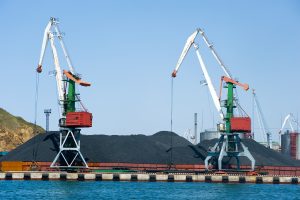Following Russia’s invasion of Ukraine, the United States and its allies put in place an extensive set of sanctions to limit Moscow’s export earnings. Russian fossil fuels were one major target. While South Korea joined the initial set of U.S. and EU sanctions on Russia shortly after the war began, Seoul did not adopt sanctions on imports of Russian fossil fuels. However, despite not formally implementing energy sanctions, South Korea has significantly reduced imports of Russian fossil fuels nonetheless.
While South Korea’s reliance on Russian fossil fuels prior to the war was less than Europe’s, immediately cutting ties with Russian suppliers would have been impractical. South Korea imports nearly 98 percent of its fossil fuels, which provide two-thirds of the country’s electricity generation. Russia accounted for a little over 9 percent of South Korea’s imports by both value and volume. South Korea was most dependent on Russia for imports of coal (17 percent) and naphtha (23 percent), but Russia was also a supplier of natural gas (5 percent) and crude petroleum (6 percent).
Despite the challenge of moving away from Russian fossil fuels while Europe and other economies were also seeking alternate sources, South Korea has made significant progress in reducing its dependence on Russia. In terms of Russian revenue – the point of economic sanctions – South Korean imports of fossil fuels declined from $13.2 billion in 2021 to just $5.5 billion last year.
This shift was driven on a corporate level by Korean firms seeking to avoid increasing risks from trade in Russian fossil fuels. On a governmental level, South Korea’s Indo-Pacific Strategy calls for increased energy security and a shift to renewable energy within the region in response to the instability in energy markets created by Russia’s invasion of Ukraine.
After significantly reducing imports of Russian crude petroleum and naphtha in 2022, South Korea eliminated Russian imports of the two products last year. Increased imports from the United States, the United Arab Emirates, and Qatar allowed South Korea to stop importing Russian crude, while Russian naphtha was replaced with increasing imports from the United Arab Emirates, Algeria, Malaysia, Singapore, and others.
South Korea has also significantly reduced imports of Russian natural gas, which are down 42 percent by volume since 2021. While Australia and the United States have remained South Korea’s top suppliers of natural gas, both have seen declines in export volumes over the last year. In Australia’s case export volumes are still above pre-war levels, if down from their 2022 high. The decrease from the United States is likely due to the significant increase in U.S. LNG exports to Europe since the war began to replace Russian supplies. In addition to supplies from the United States and Australia, South Korea has been able to increase LNG imports from Malaysia and Oman.
Despite its success in reducing most fossil fuel imports from Russia, South Korea has been unable to reduce its need for Russian coal, which now accounts for 81 percent of South Korea’s imports of Russian fossil fuels by value. If South Korea were able to significantly reduce its imports of Russian coal, it could largely stop using Russia as an energy provider.
The most significant factor holding back South Korea’s ability to eliminate Russian coal is the decline in coal imports from Australia. They were down 20 percent in 2023 by volume after declining nearly 25 percent in 2022. One of the reasons for this was China’s decision to resume imports of Australian coal in 2023 after its informal ban during the pandemic. As countries reduce their dependence on Russia as an energy source, they are having to compete for the limited alternatives.
Coal currently accounts for more than 40 percent of South Korea’s electricity generation, but under Seoul’s current energy plans coal’s percentage of electricity generation should fall to slightly below 15 percent in 2036. This will be achieved by retiring over 20 coal-fired power plants over the next decade and replacing their production with increased nuclear power and renewable energy. As South Korea phases out coal plants it will present Seoul with an opportunity to eliminate imports of Russian coal.
While Seoul has not officially adopted a policy of phasing out Russian fossil fuels, South Korea has made significant progress in doing so since the war began. It has cut total imports of Russian fossil fuels by 58 percent by value, while eliminating imports of Russian crude petroleum and naphtha. There is also a clear path to reducing and eliminating Russian coal imports in time as South Korea implements its own energy transition.

































